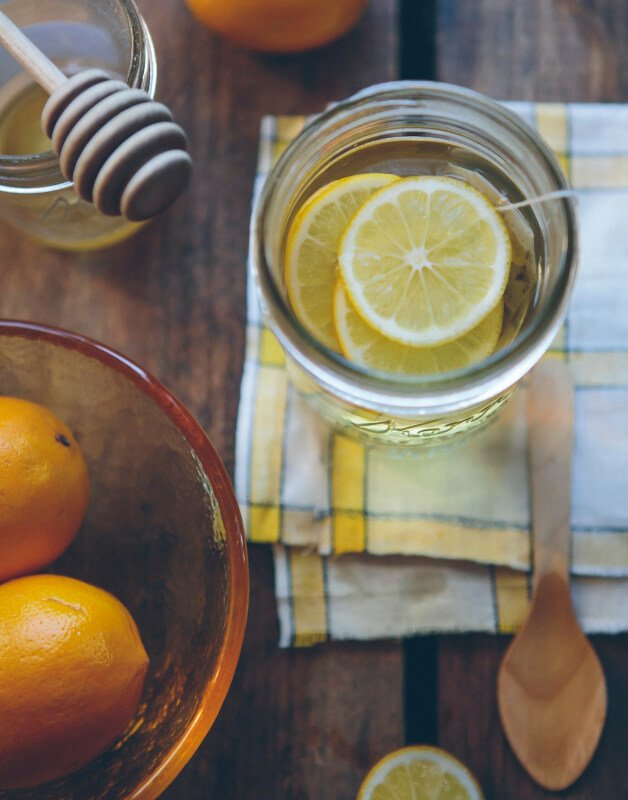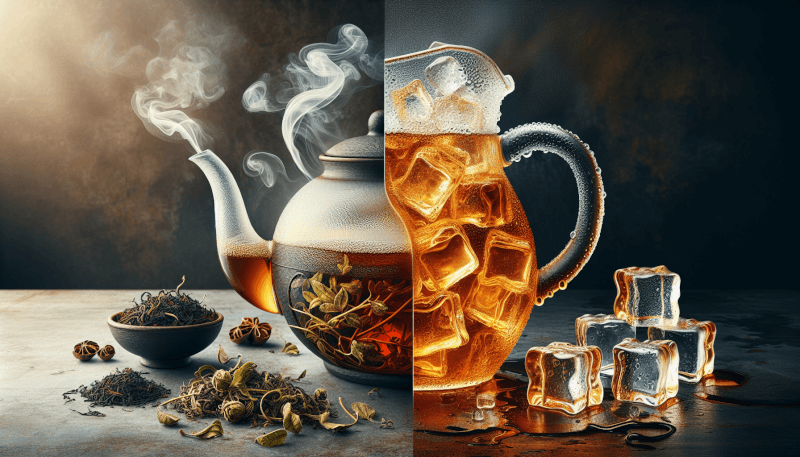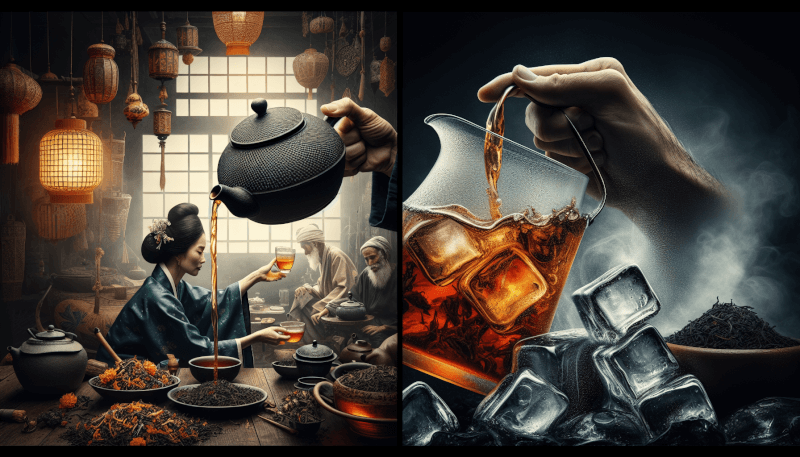Join us as we embark on a flavorful journey, exploring the myriad benefits of cold brew and hot brew tea. Delve into the depths of these two brewing methods and discover their unique charms. Whether you prefer a refreshing thirst-quencher or a comforting cup of warmth, we’ll unveil the secrets of each technique and help you choose the perfect brew for your mood. So grab your favorite mug or pitcher, and get ready to elevate your tea-drinking experience.

Taste and Flavor
Cold brew: Smooth and less bitter
Cold brew tea has gained popularity for its smooth and refreshing taste. The extended steeping time in cold water allows for a more gradual extraction of flavors, resulting in a tea that is less bitter compared to hot brew. The slow extraction process also brings out the natural sweetness of the tea leaves, creating a mellow and balanced flavor profile that is often described as smooth and subtle. Cold brew tea is a great choice for those who prefer a gentle and less intense tea experience.
Hot brew: Strong and more pronounced flavors
On the other hand, hot brew tea offers a bolder and more pronounced flavor profile. The shorter steeping time in hot water allows for a more rapid extraction of the tea’s essential oils and compounds, resulting in a stronger and more robust flavor. The heat also enhances the release of aromatic compounds, giving hot brew tea a fragrant and invigorating taste. If you enjoy a tea with a stronger flavor punch, hot brew is the way to go.
Caffeine Content
Cold brew: Lower caffeine levels
For those who are sensitive to caffeine or prefer a milder tea experience, cold brew tea is a great choice. Cold water extracts caffeine at a slower rate compared to hot water, resulting in a brew with lower caffeine content. This makes it an excellent option for those looking to limit their caffeine intake, enjoy tea in the evening, or simply prefer a more gentle pick-me-up.
Hot brew: Higher caffeine levels
If you’re in need of a caffeinated boost, hot brew tea is the way to go. The shorter steeping time and higher temperature of the water used in hot brew extracting more caffeine from the tea leaves. This makes hot brew tea a great option for those needing that extra energy kick in the morning or throughout the day.

Preparation Method
Cold brew: Steeping in cold water for an extended period
Preparing cold brew tea involves a simple and straightforward method. Tea leaves are immersed in cold water and left to steep for an extended period, usually between 8 to 24 hours. This slow and gradual steeping process allows for the full extraction of flavors without the need for heat. After steeping, the tea is strained to remove the tea leaves, leaving behind a smooth and refreshing beverage.
Hot brew: Steeping in hot water for a shorter time
Hot brew tea follows a more traditional and familiar preparation method. Tea leaves are steeped in hot water, usually between 1 to 5 minutes. The higher temperature of the water accelerates the extraction process, resulting in a quicker infusion of flavors. Once the desired steeping time is reached, the tea is strained to remove the leaves, and the hot brew is ready to be enjoyed.
Brewing Time
Cold brew: 8-24 hours
One of the advantages of cold brew tea is its flexibility in terms of brewing time. Depending on personal preference and desired strength, cold brew tea can be steeped for as little as 8 hours or as long as 24 hours. This extended brewing time allows for maximum flavor extraction and the development of a smooth and well-rounded cup of tea.
Hot brew: 1-5 minutes
Hot brew tea, on the other hand, requires a much shorter brewing time. Depending on the type of tea and desired strength, hot brew tea is typically steeped for only 1 to 5 minutes. It is important to not oversteep hot brew tea, as it can lead to a bitter taste. The short brewing time ensures a quick and efficient extraction of flavors, making hot brew tea a convenient option for those seeking a fast and flavorful cup of tea.

Temperature
Cold brew: Brewed using cold water
As the name suggests, cold brew tea is brewed using cold water. The use of cold water allows for a slower extraction process, resulting in a tea that is smoother and less intense in flavor. Cold brew tea is often prepared by simply steeping tea leaves in cold or room temperature water, making it an easy and convenient brewing method.
Hot brew: Brewed using hot water
Contrastingly, hot brew tea is brewed using hot water. The higher temperature of the water ensures a quicker extraction of flavors, resulting in a bolder and more robust cup of tea. Hot brew tea requires heating water to a specific temperature suitable for the type of tea being brewed, maintaining the water’s heat during steeping.
Acidity
Cold brew: Less acidic, smoother on the stomach
If you’re someone who experiences stomach sensitivity or acid reflux, cold brew tea may be a preferable choice for you. Cold brew tea tends to have lower acidity compared to hot brew, making it gentler on the stomach. The extended steeping time in cold water extracts fewer tannins and other compounds that contribute to acidity, resulting in a smoother and more stomach-friendly brew.
Hot brew: More acidic, can cause stomach irritation
Hot brew tea, due to its shorter steeping time and higher temperature, often has higher acidity compared to cold brew. While acidity is a desirable characteristic for some teas, it can also cause stomach irritation and discomfort in those with sensitive stomachs. If you experience acid reflux or are prone to stomach issues, opting for hot brew tea may not be the best choice.

Antioxidant Levels
Cold brew: Retains higher antioxidant levels
Antioxidants are compounds found in tea that have been associated with numerous health benefits. When it comes to antioxidant levels, cold brew tea has been found to retain higher levels compared to hot brew. The longer steeping time in cold water allows for the gradual extraction of antioxidants, resulting in a brew that is rich in these beneficial compounds. If you’re looking to maximize your antioxidant intake, cold brew tea is a great option.
Hot brew: May degrade some antioxidants during brewing
While hot brew tea still contains antioxidants, the brewing process can lead to the degradation of some of these beneficial compounds. The higher temperature and shorter steeping time in hot water may cause certain antioxidants to break down or be less effectively extracted. However, it is important to note that even with potential degradation, hot brew tea still retains notable levels of antioxidants.
Versatility
Cold brew: Ideal for iced teas and flavored infusions
Cold brew tea offers a wide range of versatility when it comes to creating refreshing and flavorful beverages. Its smooth and mellow taste makes it an excellent base for iced teas, where it can be mixed with a variety of fruits, herbs, and sweeteners to create delicious and customizable concoctions. Cold brew tea is also great for flavored infusions, allowing the flavors to meld together over an extended steeping period.
Hot brew: More suited for traditional tea preparations
Hot brew tea excels in its ability to bring out the true flavors and characteristics of different tea varieties. It is often the go-to method for traditional tea preparations, such as steeping green tea leaves to highlight their grassy, vegetal notes or brewing black tea to bring out its bold and robust flavors. Hot brew tea allows for a more nuanced tea experience and is ideal for those who appreciate the intricacies of each tea.

Shelf Life
Cold brew: Can be stored in the refrigerator for up to a week
When it comes to shelf life, cold brew tea has the upper hand. Due to its slow extraction process and low levels of acidity, cold brew tea can be stored in the refrigerator for up to a week without compromising its flavor or quality. This makes it a convenient option for those who prefer to prepare larger batches of tea in advance or enjoy a chilled beverage throughout the week.
Hot brew: Best consumed immediately
Hot brew tea, on the other hand, is best consumed immediately after brewing. The higher temperature of the water used in hot brew tea creates an environment that is prone to bacterial growth and oxidation, leading to a shorter shelf life. Unlike cold brew tea, hot brew is best enjoyed fresh and should not be stored for an extended period. For optimal taste and quality, it is recommended to prepare hot brew tea in smaller quantities.
Health Benefits
Cold brew: Lower risk of tooth decay and staining
One notable health benefit of cold brew tea is its lower risk of tooth decay and staining. The prolonged steeping time in cold water extracts fewer tannins, which are compounds that can contribute to the staining of teeth. Additionally, the lower acidity of cold brew tea is less likely to erode tooth enamel. By opting for cold brew tea, you can still enjoy the benefits of tea without worrying about the potential negative effects on your dental health.
Hot brew: May improve digestion and boost metabolism
Hot brew tea has its own set of health benefits. The higher temperature of the water used in hot brew tea can aid in digestion by promoting the breakdown of food and stimulating the movement of the digestive tract. Additionally, certain compounds in hot brew tea, such as catechins found in green tea, have been associated with boosting metabolism and aiding in weight management. If you’re looking to support your digestion or metabolism, hot brew tea may be the way to go.
In conclusion, both cold brew and hot brew tea offer unique characteristics and benefits. Cold brew tea provides a smoother and less bitter flavor profile, lower caffeine levels, and higher antioxidant retention. It is ideal for those who prefer a more mellow tea experience, want to limit their caffeine intake, or prioritize maximizing antioxidant intake. On the other hand, hot brew tea offers a stronger and more pronounced flavor, higher caffeine levels, and potential health benefits related to digestion and metabolism. It is best suited for those who enjoy a bolder and more traditional tea taste. Ultimately, the choice between cold brew and hot brew tea comes down to personal preference and the desired tea experience. So go ahead, experiment with both methods, and discover the joys of cold brew and hot brew tea. Happy brewing!


